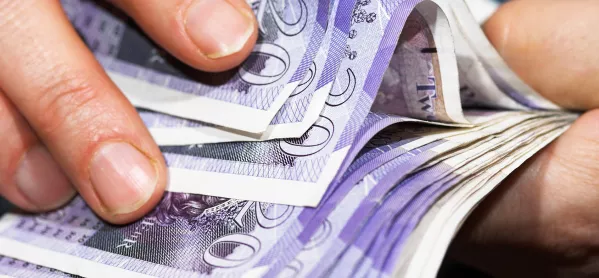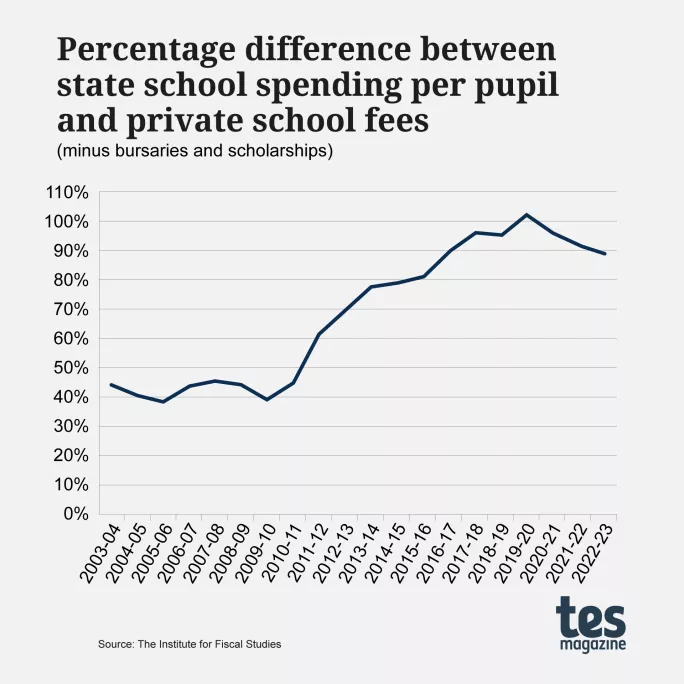Axing private school tax breaks would have ‘weak’ impact on demand

Removing tax exemptions from private schools is likely to have a limited effect on the number of pupils attending them and could boost public coffers by up to £1.5 billion, experts have said today.
The Institute for Fiscal Studies (IFS) has suggested that the number of pupils leaving the private sector to attend state schools would be “small” if VAT is imposed on school fees.
The Labour Party has said it would end the tax breaks enjoyed by private schools and use the revenue raised to help state schools.
Private schools in England can currently benefit from an 80 per cent discount on business rates, and they also do not have to pay VAT on school fees.
- News: VAT on private schools could raise ‘little’ cash for state sector
- Labour: Call for MPs to investigate private school tax status
- Background: Private school plan in 2019 Labour manifesto
The IFS report estimates that removing tax breaks from private schools - including exemptions from VAT and relief on business rates - would raise around £1.6 billion a year in extra tax revenue.
With a small movement of pupils into the state sector, costing around £100 million to £300 million a year, this would lead to a net gain to the public finances of £1.3 billion to £1.5 billion a year, the IFS said.
The research, funded by the Nuffield Foundation, predicts that there could be between a 3 per cent and 7 per cent fall in private school attendance (or around 20,000 to 40,000 pupils) as a result of a 15 per cent effective VAT rate.
Widening gap
Today’s report also finds that the gap between average private school fees and state school spending per pupil has more than doubled since 2010.
In 2022-23, average private school fees across the UK were £15,200 in today’s prices (net of bursaries and scholarships). This is 90 per cent higher than state school spending per pupil, which was £8,000 in 2022-23. In 2009-10, the gap was about 40 per cent, or £3,500.

In a speech last week, Labour leader Sir Keir Starmer said money raised from removing tax breaks on private schools would be used to give primary schools cash for “world-class early language innovation”.
The party has previously said the funds raised from ending tax breaks for private schools would also be used to help recruit more than 6,500 new teachers into the state sector.
Luke Sibieta, research fellow at the IFS and author of the report, said: “The evidence suggests higher fees are likely to have a weak effect on demand.”
He added: “If the main aim of removing tax exemptions from private schools is to raise revenue, then this is likely to be achievable.
“If the aim is to encourage more pupils into the state sector and reduce inequalities by school attended, then this policy package is likely to have only minor impacts.”
Last month, a report by the EDSK think tank suggested that adding VAT to private school fees could raise “very little” new revenue if a quarter of pupils leave the independent school sector.
Julie Robinson, chief executive of the Independent Schools Council, said: “Even an over-optimistic estimate - which this most certainly is - leaves Labour significantly short of funding the education policies they claim a tax on parents would pay for.
“The IFS itself admits its calculations on pupil movement are uncertain and based on limited evidence - we believe the number moving from independent schools will be much higher in practice.
“However, we are glad to see the IFS recommend that nursery and bursary pupils are exempt from any punitive tax, and we seek urgent clarification on whether Labour will accept these recommendations.”
Bridget Phillipson, Labour’s shadow education secretary, said: “This analysis reinforces the fact that all of Labour’s policies are fully costed and fully funded, because we take fiscal responsibility seriously...Labour will fund our fully-costed plans to drive high and rising standards in our state schools by ending private schools’ unjustifiable tax breaks.”
You need a Tes subscription to read this article
Subscribe now to read this article and get other subscriber-only content:
- Unlimited access to all Tes magazine content
- Exclusive subscriber-only stories
- Award-winning email newsletters
Already a subscriber? Log in
You need a subscription to read this article
Subscribe now to read this article and get other subscriber-only content, including:
- Unlimited access to all Tes magazine content
- Exclusive subscriber-only stories
- Award-winning email newsletters
topics in this article



